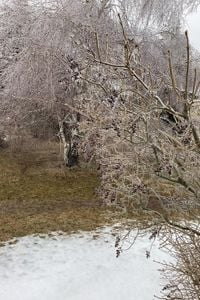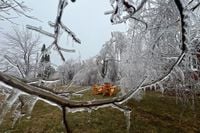As freezing rain sweeps across New Brunswick, most schools in the province are closed on March 31, 2025, following warnings from Environment Canada about the severe weather. The storm has affected Anglophone and francophone school districts alike, with closures reported in the west, east, and north of the province. In Anglophone School District South, however, schools will open on time, albeit with buses operating on a one-hour delay.
The weather warning was issued on Sunday afternoon, March 30, 2025, indicating that a warm front would pass through New Brunswick, turning snow into freezing rain. According to Environment Canada, between five and ten millimeters of freezing rain is expected across the province, with lesser amounts along the Fundy coast. This weather phenomenon poses risks of icy roads and walkways, potentially leading to accidents and utility outages.
“Freezing rain will transition to rain later this morning for southern New Brunswick and this afternoon for the northern half of the province,” the Environment Canada alert states. The freezing rain is anticipated to last between four and eight hours, with temperatures expected to rise above 10°C later in the day.
In addition to New Brunswick, the storm has already wreaked havoc in Ontario, where hundreds of thousands remain without power due to the effects of freezing rain. As of March 31, 2025, over 390,000 homes and businesses in Ontario were still without electricity, according to Hydro One. The utility company reported that nearly 360,000 customers have had their power restored, but many are still facing outages on the third day of the spring storm.
In response to the severe weather, warming centres have been opened in Orillia and Tay Township, areas that have been particularly hard-hit. The cities of Orillia and Peterborough, along with the Muskoka district, have declared states of emergency as they cope with the aftermath of the storm.
“At the very end of our driveway, we had a hydro pole completely ripped in half because trees went down and took the wires down,” said Janelle Baker, a resident of Bracebridge, Ontario. She described the scene outside her home as “carnage,” likening it to a tornado aftermath. Baker recounted listening to the eerie sounds of trees cracking and falling during the storm.
As the freezing rain system moves east, Environment Canada has issued warnings for Quebec, New Brunswick, and parts of northern Nova Scotia and Prince Edward Island. The weather agency cautioned that similar storms in the past have caused significant disruptions, including transportation delays and damage to infrastructure.
“If you're travelling north, expect delays and detours,” advised Sgt. Kerry Schmidt of the Ontario Provincial Police, who noted that downed power lines and fallen trees have made some roads impassable. Police have also reported additional emergency calls due to injuries caused by falling trees.
As the storm continues to impact multiple provinces, residents are urged to stay indoors and avoid unnecessary travel. The freezing rain is expected to develop into ice pellets and rain by later in the day, creating hazardous conditions on roads and walkways.
In New Brunswick, the freezing rain warning has been met with preparations among local authorities, who are bracing for potential power outages and disruptions to daily life. “Surfaces such as highways, roads, walkways, and parking lots may become icy and slippery,” the Environment Canada warning cautioned. “Ice build-up may cause tree branches to break, leading to further risks of outages.”
As of 6 a.m. on March 31, 2025, flights from Fredericton, Moncton, and Saint John were reported to be on time, but the situation remains fluid as the storm progresses. Residents are advised to stay tuned to local weather updates and heed warnings from authorities.
The storm has highlighted the vulnerabilities of infrastructure during severe weather events, prompting discussions about preparedness and response in the face of climate-related challenges. As communities across the region cope with the impacts of the storm, the focus remains on safety and recovery.
In conclusion, the freezing rain sweeping through New Brunswick and Ontario serves as a stark reminder of the power of nature and the importance of being prepared for severe weather. Residents are encouraged to take necessary precautions and stay informed as the storm continues to unfold.







